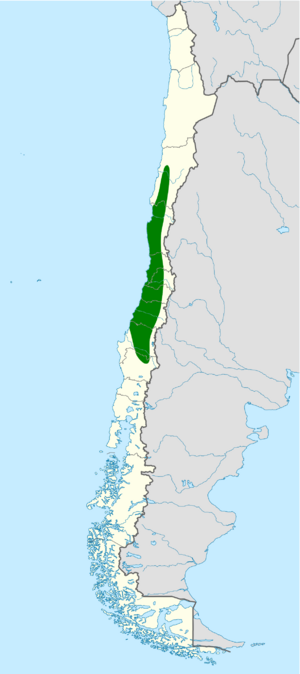Dusky tapaculo facts for kids
Quick facts for kids Dusky tapaculo |
|
|---|---|
| Conservation status | |
| Scientific classification | |
| Genus: |
Scytalopus
|
| Species: |
fuscus
|
 |
|
The dusky tapaculo (scientific name: Scytalopus fuscus) is a small bird. It belongs to a special bird family called Rhinocryptidae, known as "tapaculos." This bird lives only in Chile, which means it is endemic to that country.
Contents
What is a Dusky Tapaculo?
The dusky tapaculo was once thought to be a type of Magellanic tapaculo. However, scientists found that it sings differently. Because of these unique songs, and because both birds live in some of the same areas, it was decided that the dusky tapaculo is its own separate species.
How to Spot a Dusky Tapaculo
This bird is about 11 centimeters (4.3 inches) long. It is mostly gray all over. The feathers on its back are darker gray, and its belly is a lighter gray. Sometimes, its lower back and rump have a brownish color. Its sides might also have a light brownish-yellow color with black stripes.
Where Dusky Tapaculos Live
You can only find the dusky tapaculo in central Chile. It lives from the southern Atacama Region all the way south to the Biobío Region. These birds can be found from sea level up to about 800 meters (2,600 feet) high. They like to live at the bottom of valleys that have lots of thick plants and trees.
Dusky Tapaculo Behavior
What They Eat
Scientists don't have much information about what the dusky tapaculo eats. They also don't know how it finds its food.
How They Raise Their Young
Not much is known about how these birds breed. Only one nest has ever been described! This nest was shaped like a ball. It was made from plant roots and moss. Inside, it was lined with horse hair. The nest was placed at the end of a tunnel about 0.6 meters (2 feet) long.
Their Special Song
The dusky tapaculo has a unique song. It is a short, rising trill that repeats over and over. You can listen to it here: [1].
Is the Dusky Tapaculo in Danger?
The IUCN (International Union for Conservation of Nature) has looked at the dusky tapaculo. They say it is a species of "Least Concern." This means it's not currently in danger of disappearing. The bird is quite common in some places and lives in at least one protected area.
However, many of its natural homes have been destroyed. The remaining areas where it lives are now broken up into smaller pieces. Because of this, experts think the dusky tapaculo should probably be watched carefully to make sure it stays safe.


